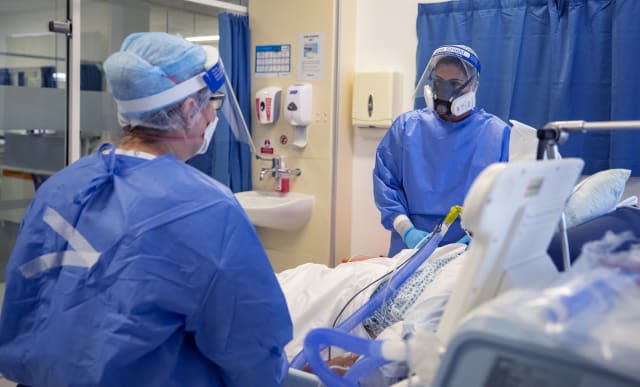Are fewer people in hospital with Covid dying in the second wave?

A Government scientific adviser has said that the fatality rate in coronavirus patients in hospital has almost halved since the first wave.
Professor Peter Horby, a member of the Scientific Advisory Group for Emergencies (Sage), told a committee of MPs that the rate appeared to have fallen to about 15%.
Here PA looks at whether a lower proportion of patients are dying of Covid-19 in hospital now than during the first wave.
– What did Prof Horby say?
Giving evidence to the Science and Technology Committee on Wednesday Prof Horby said that the case fatality rate in patients in hospital appeared to be about 30% in the first wave and now appears to be 15%.
But he also warned that caution was needed because the age profile between the two waves was different and the rate could increase as more older people are admitted to hospital.
Prof Horby, professor of emerging infectious diseases and global health at the University of Oxford, added: “But it does indicate, I think, that the NHS is getting better at treating Covid patients and I think there are a number of areas where that improvement has happened.”
– Are a lower proportion of coronavirus patients dying in hospital compared to the first wave?

Without access to the same data it is not possible to see the numbers Prof Horby are referring to.
But the most recent data from the Intensive Care National Audit and Research Centre (ICNARC) shows that 448 (19.1%) of the 2,350 confirmed Covid-19 patients admitted to critical care after September 1 died.
This compares to 4,293 (39.3%) of the 10,910 confirmed Covid patients admitted to critical care up to August 31.
The report, published on October 30, analysed data on patients critically ill with confirmed Covid-19 from critical care units in England, Wales and Northern Ireland taking part in the ICNARC programme.
But this report only includes patients admitted to critical care units so does not give data on coronavirus patients who died in other hospital departments.
– Why are fatality rates improving?
Several experts agree that one of the reasons that the proportion of people dying with the disease in hospitals is dropping is due to improvements in treating patients with coronavirus.
These include the steroid dexamethasone and the reduction in the need to use ventilators.
The Faculty of Intensive Care Medicine’s vice dean Dr Daniele Bryden said that at the start of the pandemic there was very little evidence about any treatments compared to now.
She added: “Based on what we know about the beginning of the year and the first wave, mortality is improving because we have new treatments like not ventilating people and giving them CPAP (continuous positive airway pressure). We have got steroids.
“That’s a lot of knowledge for a new disease that we didn’t know how to manage at the beginning of the year.”
– Are the patients different in the second wave compared to the first?
Prof Horby told MPs that that age profile was different compared to the first wave but suggested an increase in older patients was possible.

But Professor Duncan Young at the University of Oxford said it also appeared as if the patients in critical care in the second wave were “equally unwell” to those in the first.
He added: “The demographic and medical history tables suggest the patients in this wave are broadly similar to the last wave.
“The APACHE II scores – a measure of sickness – are not a lot different, and the patients admitted in the second wave to date have very slightly worse impairment of oxygen uptake in the lungs compared with the first wave.
“Thus they seem to be equally unwell in the second wave.”
– Could death rates still worsen?
Prof Horby did say that there was a risk that if more elderly people are admitted to hospital the rate will creep up.
The ICNARC data also shows that while less than 1% of patients admitted before August 31 were still receiving critical care this jumped to 40% of those admitted after September 1.
This suggests there are a number of patients who could still die and increase the rate of deaths in critical care.
But Dr Bryden said: “It is unlikely all those patients are going to go into the deaths group. It’s going to be very similar mortality or even slightly better.”
– Is it too early to say that mortality has improved?
Dr Bryden said it was not too early to say mortality in critical care had improved because there were now better treatments and more knowledge of how to tackle the virus.
She added: “You would expect mortality to improve, you would not expect it to be a situation where you see this is not getting better.”
But Prof Young said that until the outcome for all the patients was known the true rate could not be determined.
He added: “As the outcome for all the patients is unknown the true case fatality rate cannot be determined. Therefore one cannot conclude that the mortality is lower in the second wave.”


